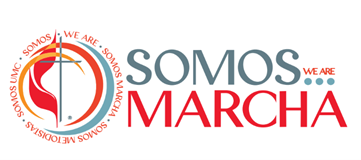Open Letter to the Council of Bishops of the United Methodist Church
Dear Bishops, we greet you in the name of Christ and on behalf of MARCHA (Methodists Associated Representing the Cause of Hispanic/Latinx Americans). We write to you with a trouble
When Apologies Fail Us – A Call to Repentance (Reflections on recent events at the Arkansas Annual Conference Session)
Reflections on recent events at the Arkansas Annual Conference Session “Tension” is not an adjective fit enough to describe the days we are living. We are walking on
BMCR supports MARCHA’s Advocacy for Bishop Minerva Carcaño and NAIC expresses its solidarity with MARCHA
05/18/2022 – On March 9, 2022, the Western Jurisdiction Committee on the Episcopacy and the Western Jurisdiction College of Bishops announced that Bishop Minerva Carca�
MARCHA RESQUESTS GCORR AND GCSRW TO MONITOR THE PROCESS OF THE COMPLAINTS AGAINST BISHOP MINERVA CARCAÑO
MARCHA officially requested the General Commission on Religion and Race (GCORR) and the General Commission on Status and Role of Women (GCSRW) of the United Methodist Church (UMC)
MARCHA REQUEST THE WESTERN JURISDICTION COLLEGE OF BISHOPS OF THE UMC TO LIFT THE SUSPENSION OF BISHOP MINERVA CARCAÑO
On March 9, 2022, the Western Jurisdiction announced the suspension of Bishop Minerva Carcaño. MARCHA (Methodists Associated Representing the Cause of Hispanic/Latino Americans) r
Open Letter to the Western Jurisdiction College of Bishops and the Episcopacy Committee Regarding Bishop Carcaños’ Suspension
. MARCHA is puzzled by the decision of the Western Jurisdiction’s College of Bishop to suspend Bishop Carcaño while a special committee investigates the complaints related to th
MARCHA’S REQUEST TO WESTERN JURISDICTION REGARDING BISHOP CARCAÑO
March 11, 2022 – MARCHA (Methodists Associated Representing the Cause of Hispanic/Latino American) represents a critical voice for the Hispanic/Latino community within The Un
MARCHA 2021
After this I looked, and there was a great multitude that no one could count, from every nation, from all tribes and peoples and languages, standing before the throne and before th
VOICES: Latin@s – In the Heights – In Our Pews?
It is the same story of neighborhood, community, church family and the struggle to figure out how we are supposed to be, how to survive and what we are supposed to give up from our
VOICES: Latin@s, Hispanics, Latinx: ¡Si! To All of it!
By Rev. Lydia Muñoz - It's fair to say that most people when asked to describe Latinos in the United States would probably be limited to naming a few celebrities and athletes, and
